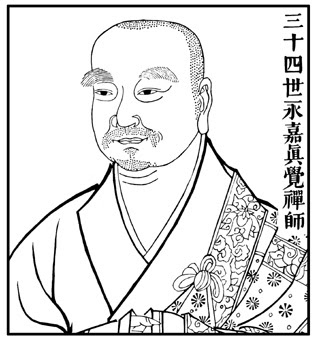Red Pine's book calls him Yung-Chia, in the text he calls him Hsung-chueh, and Wikipedia calls him Yongjia Xuanjue (665 - 713). His Dharma name is Mingdao, meaning bright path. He lived to be 48. He supposedly died while meditating. Emperor Xuanzong gave him the posthumous name Wuxiang (無象), meaning 'without phenomena'.
He is also called maybe "The Overnight Guest" and "One Night Chueh" because he stayed with Huineng one night. The story goes:
"Yongjia met a monk named Xuance. Xuance was a disciple of Huineng and was sufficiently impressed with Yongjia that he convinced him to accompany him back to Caoxi to meet Huineng. Upon arriving, Yongjia walked around Huineng three times, then stood in front of him holding his staff. Huineng said, “A monk is capable of three thousand modes of deportment and eighty thousand ways of behavior. Where, sir, did you get such arrogance?”
Yongjia said, “Birth and death are important, but impermanence is also impermanent.”
Huineng said, “Have you not yet understood what is not born or comprehended what is not impermanent?”
Yongjia said, “Understanding is, in fact, what is not born, and comprehension is essentially what is not impermanent.”
Huineng said, “Indeed, so they are. So they are.”
Yongjia then made a full prostration and said he was leaving.
Huineng said, “You are leaving too soon.”
Yongjia said, “I can’t really move. How could I do so too soon?”
Huineng said, “Who is it who knows he doesn’t move?”
Yongjia said, “You, sir, are creating distinctions.”
Huineng said, “You have truly penetrated the meaning of what is not born.”
Yongjia said, “How could what is not born have any meaning.”
Huineng said, “Who is it who is distinguishing no meaning?”
Yongjia said, “Distinguishing has no meaning.”
Huineng said, “Wonderful! But at least stay the night.”
And so, Yongjia became known as One-night Jue, Jue
being part of Yongjia’s ordination name, Xuanjue.
The date of this exchange was 705." (Early Pine)
Hsung-chueh saw himself as getting the teachings from reading, he didn't really identify with Huineng who certified him as enlightened (recorded in the Transmission of the Lamp). He was also friends with Xuanlang the 5th patriarch of Tientai. He supposedly got enlightened while reading the Nirvana Sutra and the Vimalakirti Sutra (Pine p. 6).
The second monastic name is where he's from, he was from Xuanjue, in southeast China, now called Wenzhou, directly north of Taiwan, south of Shanghai, a bit in from the coast, and at the mouth of the Oujiang river. They speak Wu Chinese there. Supposedly this is a main dialect in Flushing and Brooklyn Chinatowns.
"Prior to 1949 there were 2,000 registered places of worship and 4,500 priests, pastors and monks in the city. But, the state officially designated Wenzhou as an experimental site for an "atheistic zone" (无宗教区) in 1958 and during the Cultural Revolution (1966–1976), religious buildings were either closed or converted for other uses."
The Song of Enlightenment is an 8th century poem. There are pictures of the text in the chapbook by Pine.
Hsung-chueh suggests in the poem that liars will spend many eons having their tongue pulled out. Later he says, "an army of demons can't destroy the truth." (stanza 62). It's like a praying mantis blocking the way (of a human).
"22. I moved to a mountain and found a quiet place
steep and secluded beneath tall pines
an outsider monk I enjoy sitting still
settled at last I’m truly at peace"
There are 63 stanzas of these 4 lines, 2 lines in Chinese (7 have 3 lines). Read the wonderful thing for yourself.
I have some funny thoughts, like that Sunaksatra, supposedly one the Buddha's sons who attained deep understanding, but feel in with someone evil, and I'm guessing became something of a Darth Vader. This is from the Nirvana Sutra.
Hsung-chueh is against traveling from teacher to teacher. He's more in favor of the sudden teaching.
Another Angulimala and Milarepa, supposedly Yung-shih committed adultery and murder before coming enlightened. I can't find any reference to him or her online. They say he's one of the 35 omnipresent buddhas, I'm not sure which, not sure if that's related to the 35 confession Bodhisattvas. I'm getting lost in the weeds. He does seem to think the buddha would drop the minor rules, and seem to think monstatic quibbling about the vinaya was unskillful.
A very interesting little poem.
Links:
PDF of unnamed translation Song of Enlightenment. I think it's Red Pine's but the introduction is different and similar. I will call this Early Pine.
Other poems by Hsung-chueh





No comments:
Post a Comment